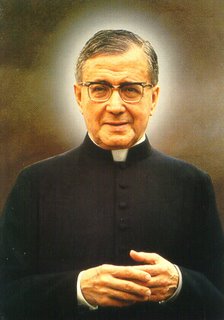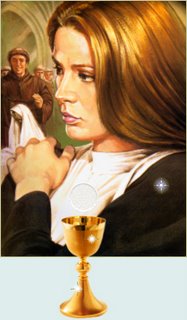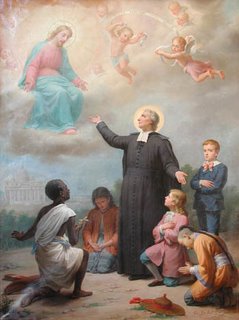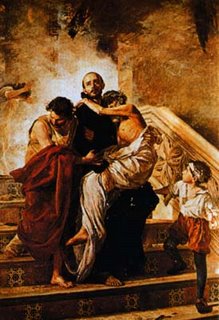
There has been much controversy of late involving the Order of Opus Dei, much of it malicious and driven by ignorance. Let us examine the life if its founder, Josemaria Escriva.
Josemaria was born in the year 1902 the birth of a new century. He was born in Spain to very devout parents, he also had one brother and four sisters, three of whom would die young. This gave the young Josemaria a feeling of the temporariness of life, and perhaps led to his making the best of what life offered with a spirit of thanksgiving to God.
The family was not wealthy, and due to financial difficulties the Escriva family moved to Logrono in order for his father to find work within the textile industry. The family lived devout lives of worship and prayer but also hard work. In order to feed the family everybody had a job to do which they fulfilled with a spirit of cheerfulness but also hardiness. It was also in Logrono that Josemaria first felt a 'calling' from God, that gentle whisper that moves within the soul. As air brushes upon the face leaving no mark but the knowledge that it was there, so the Holy Spirit works within the soul.
The thought of the Priesthood took up the thoughts of the young Josemaria and he could not forget that gentle whisper which called him to move beyond what he had always known into the unknown of what exactly is God's Will. Josemaria listened and obeyed that small still voice and with the approval of his parents he not only studied for the Priesthood, he also under instruction from his father studied law in order to gain a Doctorate. Sadly for Josemaria, his father died in 1924 a year before he was Ordained into the Priesthood. Though saddened by his fathers death nothing though could quell the joy that Fr. Josemaria felt within his heart at his Ordination.
Josemaria was not a man given to fanciful idea's. Though he felt the call to follow and serve God he was not a man for star gazing but rather a commonsensical individual who, though obstacles were placed in his way, he was able to circumvent them, rather than be overcome by them. From a young age he understood that Saints are not soft hearted, but, they instead were fierce spiritual warriors with an intense love of God which overcame there baser instincts. Always the young Josemaria understood the battle with good and evil. That it was a daily struggle and through Christ it can be won not by man's efforts but through the Victory of Christ won for all on Calvary. Though Josemaria was a man of a practical nature, he was also a mystic of the modern era, who understood that in order to truly love God, then man must choose to do God's Will above their own, and to understand the difference.
It was in 1927 that Fr. Josemaria moved to Madrid to finish his doctorate in law with the permission of his Bishop. While there Fr. Josemaria impressed all who met him with his inherent cheerfulness in the face of adversity and his willingness to listen to others with the greatest respect, a gift greatly needed in these irreverent times. Though known for his piety and greatly respected among his contemporaries, Fr. Josemaria was never self righteous or self satisfied. What burned within the heart of this young Priest was the intense love he felt for Christ and through this intense love he radiated simple holiness to all he met, while keeping his focus always on Christ and never losing sight about what Faith is and what it is not.
Fr. Josemaria would spend many hours in prayer before the Blessed Sacrament as he sought to fulfill God's Will in his own life. It was while he was on a spiritual retreat that this simple Priest was touched by God in an extraordinarily simple way, Fr. Josemaria was able through the Grace of God to 'see' his true vocation.
In a world that was growing more and more complicated, where peoples morals were becoming more and more loose, and where rumours of war began to fester, the way became clear for Fr. Josemaria Escriva. So it was that in 1928 Fr. Josemaria began to set up his new Order called Opus Dei which incorporates daily activities with a new spirit, that of simplicity, to give to God all of one's activities however great or mundane. In a complicated world, Fr. Josemaria chose an uncomplicated path to the centre of God's Heart and that is to make God the centre of one's entire existance, incorporating every task every thought every deed with God at the centre.
What Fr. Josemaria understood was that without God at the centre of all of our daily activities whether it be washing dishes or working in factories or offices, life was meaningless without God at it's centre for it is God that sanctifies all we do when we offer it to the Triune Spirit with holy simplicity. It is God that dignifies the work produced by both men and women and through their work man's life has gained a richness and depth not felt before as all is offered up to a loving and compassionate God. All work whether it be in the workplace or as a homemaker becomes ennobled through the Grace of God and putting into effect the Gifts that God has given to each of us. This is the Spirit of Opus Dei the 'Way' of holy simplicity.
War though would intrude as Fr. Josemaria like many others watched in anguish as Spain was torn apart within by civil war. Fr. Josemaria eventually escaped into France and returned to Spain when the Spanish civil war had ended. During the war years he gave many retreats to all who longed for a more simple and less complicated world as war torn Europe was encased in darkness and a shadow hung over those whose lives were in danger.
When the war was over in Europe as many countries recovered from the devastation Fr. Josemaria moved to Rome and furthered his studies in theology and to obtain recognition for his new movement. This recognition would come in steps as Pope Pius XII gave a decree of praise to be followed 3 years later by the Church's full approval for the Religious Order Opus Dei.
Throughout his life Fr. Josemaria embraced simple virtues and a simple life, he did not complicate God's Love he simply loved God in everything he did. At the heart though of all of Fr. Josemaria's activities was prayer, for without prayer then one will soon find themselves working for selfish reasons rather than Godly ones. Without prayer the soul will wither and die or become self absorbed to such an extant that any little inconvenience will overcome it, this is why Fr. Josemaria spent much time in prayer and placed it's importance at the top of his list. It is only in prayer that one finds the Way rather than lose the way by filling your day with empty and meaningless activities. Busyness does not signify holiness.
Fr. Josemaria also understood the working man and woman's life whether it be through gainful employment or as a homemaker work had to be done, wages must be brought home and food must be cooked in a clean household. The revolution that Fr. Josemaria would begin was to make this very work a prayer, for he understood that working fathers and mothers did not have hours to spend in quiet and solitary prayer, therefore through the Way both parents could turn their work into a prayer for the love of God. He also taught that prayer through every circumstance was crucial, one cannot praise God for good things one day then curse God the next when adversity strikes, instead one must persevere through adversities while still praising God as mature Catholics.
Because of the simplistic message of Opus Dei this movement soon gained much ground as many enquired to Fr. Josemaria to set up Opus Dei in their own parishes as many overworked and tired people longed to understand how to make their lives more tolerable and even more so, more meaningful. Opus Dei would show them the Way to God's Heart which is the simple path of prayer, penance for one's own sin's and for the reparative sins of others through suffering. To offer up the whole day through every activity to God alone thereby incorporating God so that the Spirit breathes as one through man's surrender of his own willfulness, and instead embracing Godly selflessness.
In a world grown cold Opus Dei breathed new life upon the hearts of the faithful as each of us long to become closer to God but many fail to find the Way thereby becoming discouraged along life's journey. Through this new movement many would find their lives becoming more luminous not through lofty thoughts or activities but through the mundane ordinariness of everyday life. This is the way to God's Heart, not great deeds but through little deeds done with greatness of heart, that is the key to God's Heart. This is what Fr. Josemaria discovered on that grey morning, when he saw the footprints of the Carmelite Priest as a young lad and dreamed of what could be when the soul allows God to consume it of it's emptiness and replace it with the burning fierceness of God's fiery love.
Though controversy would hound all of Fr. Josemaria's steps he did not allow this to interrupt his inherent cheerfulness, for what God Will's man will not destroy.
Fr. Josemaria Escriva died in the year 1975.
Saint Josemaria Escriva was canonized in the year 2002 by Pope John Paul II.
Some Quotes
"Your ordinary contact with God takes place where your fellow men, your yearnings, your work and your affections are. There you have your daily encounter with Christ."
"In order to love and serve God, it is not necessary to do extraordinary things. Christ asks all men without exception to be perfect as His heavenly Father is perfect (cf. Mt 5: 48). For the great majority of men, to be holy consists of sanctifying their work, to sanctify themselves in their work, to sanctify others with work, and also to find God on the road of their life."
"I began to have an inkling of what Love is, to realise that my heart was yearning for something great, for love."
"Place Christ at the heart of all human activities by means of work that is sanctified, and sanctifies both the doer and those for whom it is done."



